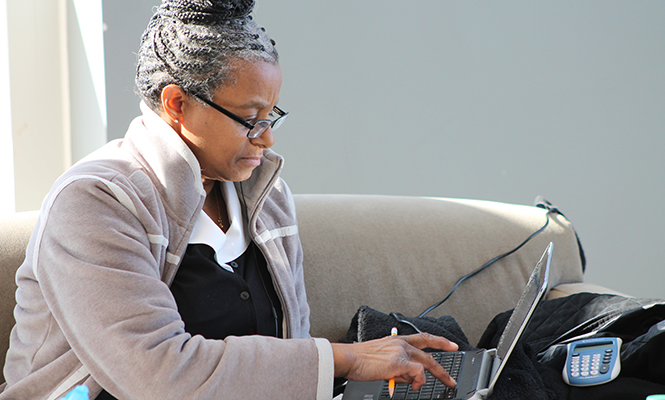Online courses to cost the same across campuses
Pamela Carter, Kent State – Stark student, studies for her online statistics class.
March 6, 2014
Deborah Huntsman, associate vice president of continuing and distance learning, said within the next two academic years, the cost of online classes will increase so they cost the same at every campus. Currently, if a student enrolls in an online class at a regional campus, he or she will pay less than if the student were to enroll in an online class at the Kent campus.
“Originally, some were offered at Kent campus, and some were offered at regional campuses,” Huntsman said. “It’s something we understand better now.”
Huntsman said understanding how online classes work has been a learning process.
She said students pay standard tuition: Online and face-to-face classes have equal cost in coordination to the tuition they pay at the campus.
Stark campus Dean Walter Wagor, said changing the price of online courses is a solution to students at the Kent campus enrolling in online classes at regional campuses.
“Right now, there is an incentive for Kent campus students to take online classes at the regional campuses for the price differential,” Wagor said.
Wagor also said the cost of education for the regional campus students will increase depending on how many online classes students decide to take.
“It’s going to be affected by the mix of face-to-face and online courses they take,” Wagor said. “To the extent they take more online courses, it will cost them more than the average regional campus student.”
Wagor said that while regional campus students might wonder why the price of online classes increased while face-to-face classes have not, he understands the university’s point of view.
“Students aren’t coded as being at a certain campus,” Wagor said. “It’s an easy solution to what has been identified as a problem.”
Students taking classes at the Stark campus have mixed feelings about the change.
Matt Linhares, freshman architecture and environmental design major, said online classes should still be cheaper at regional campuses. He said he thinks students will feel unsure about the price change.
“I know some students don’t like online classes because of the interaction, but I know some do like them,” Linhares said. “If you have to pay more, why would you want to?”
Sophomore biology major Brian Moore, said he thinks the cost of online classes should stay as it is because students don’t learn the same way in online classes.
“You lose a lot,” Moore said. “In online classes, you just turn work in and hope it’s OK. It’s just not the same.”
Pamela Carter, senior human development/family studies major, said she has is conflicted about on the change in cost.
“If they’re online, I don’t see what the difference in price is,” Carter said.
However, Carter also said there are other factors to take into consideration, such as how professors of the online courses are paid.
“If [professors] are paid less than those on Kent campus, then the class should cost less,” Carter said. “I think that is what would make the difference.”
Contact Marissa Barnhart at [email protected].












